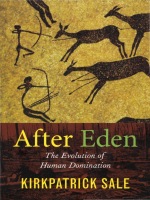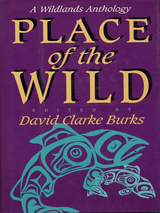
In After Eden, Kirkpatrick Sale answers these questions in a radically new way. Integrating research in paleontology, archaeology, and anthropology, he points to the beginning of big-game hunting as the origin of Homo sapiens’ estrangement from the natural world. Sale contends that a new, recognizably modern human culture based on the hunting of large animals developed in Africa some 70,000 years ago in response to a fierce plunge in worldwide temperature triggered by an enormous volcanic explosion in Asia. Tracing the migration of populations and the development of hunting thousands of years forward in time, he shows that hunting became increasingly adversarial in relation to the environment as people fought over scarce prey during Europe’s glacial period between 35,000 and 10,000 years ago. By the end of that era, humans’ idea that they were the superior species on the planet, free to exploit other species toward their own ends, was well established.
After Eden is a sobering tale, but not one without hope. Sale asserts that Homo erectus, the variation of the hominid species that preceded Homo sapiens and survived for nearly two million years, did not attempt to dominate the environment. He contends that vestiges of this more ecologically sound way of life exist today—in some tribal societies, in the central teachings of Hinduism and Buddhism, and in the core principles of the worldwide environmental movement—offering redemptive possibilities for ourselves and for the planet.

Where and what is the place of the wild? Is the goal of preserving biodiversity across the landscape of North America compatible with contemporary Western culture?
Place of the Wild brings together original essays from an exceptional array of contemporary writers and activists to present in a single volume the most current thinking on the relationship between humans and wilderness. A common thread running through the volume is the conviction that everyone concerned with the natural world -- academics and activists, philosophers and poets -- must join forces to re-establish cultural narratives and shared visions that sustain life on this planet.
The contributors apply the insights of conservation biology to the importance of wilderness in the 21st century, raising questions and stimulating thought. The volume begins with a series of personal narratives that present portraits of wildlands and humans. Following those narratives are more-analytical discourses that examine conceptions and perceptions of the wild, and of the place of humanity in it. The concluding section features clear and resonant activist voices that consider the importance of wildlands, and what can be done to reconcile the needs of wilderness with the needs of human culture.
READERS
Browse our collection.
PUBLISHERS
See BiblioVault's publisher services.
STUDENT SERVICES
Files for college accessibility offices.
UChicago Accessibility Resources
home | accessibility | search | about | contact us
BiblioVault ® 2001 - 2024
The University of Chicago Press









